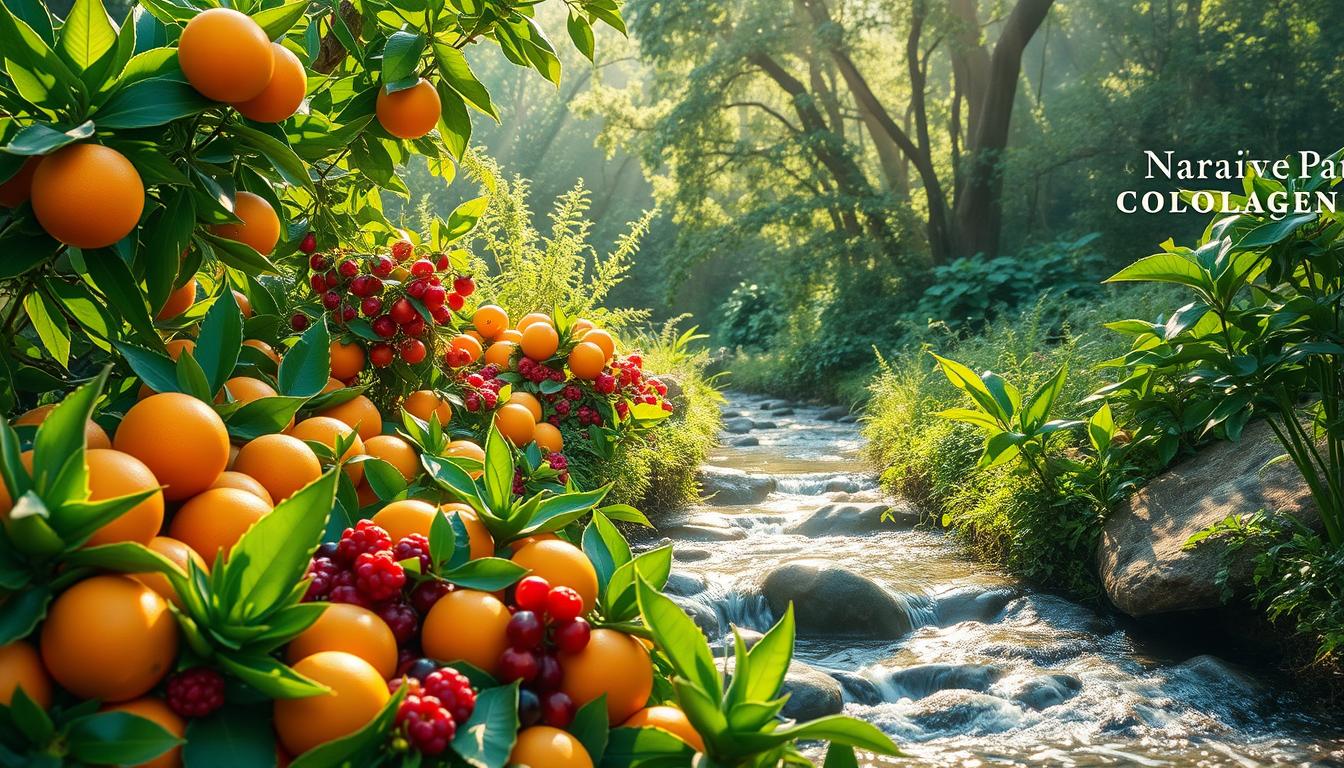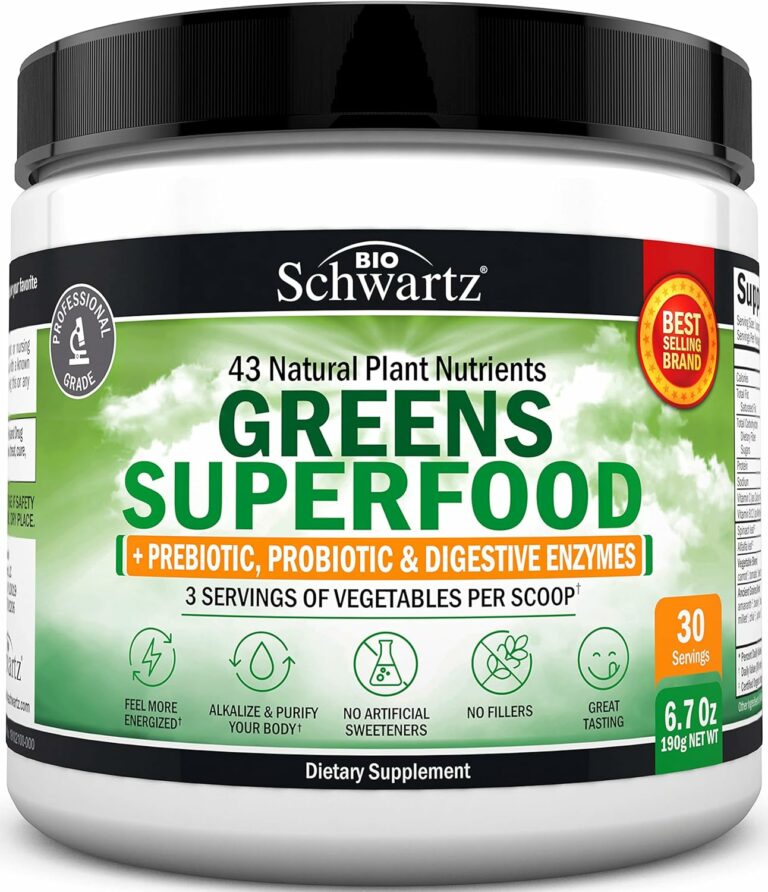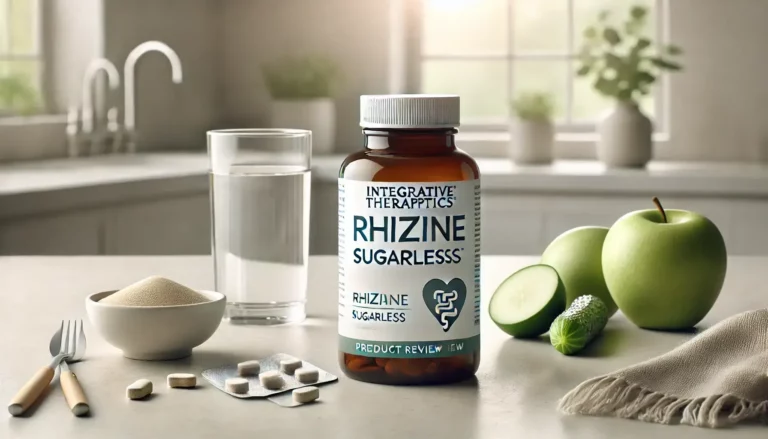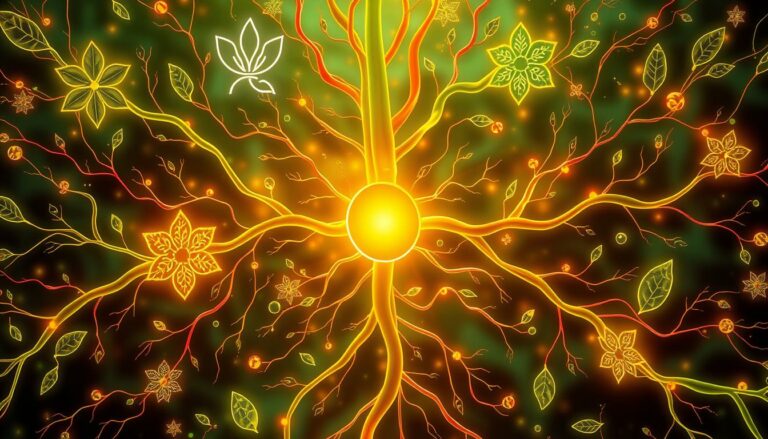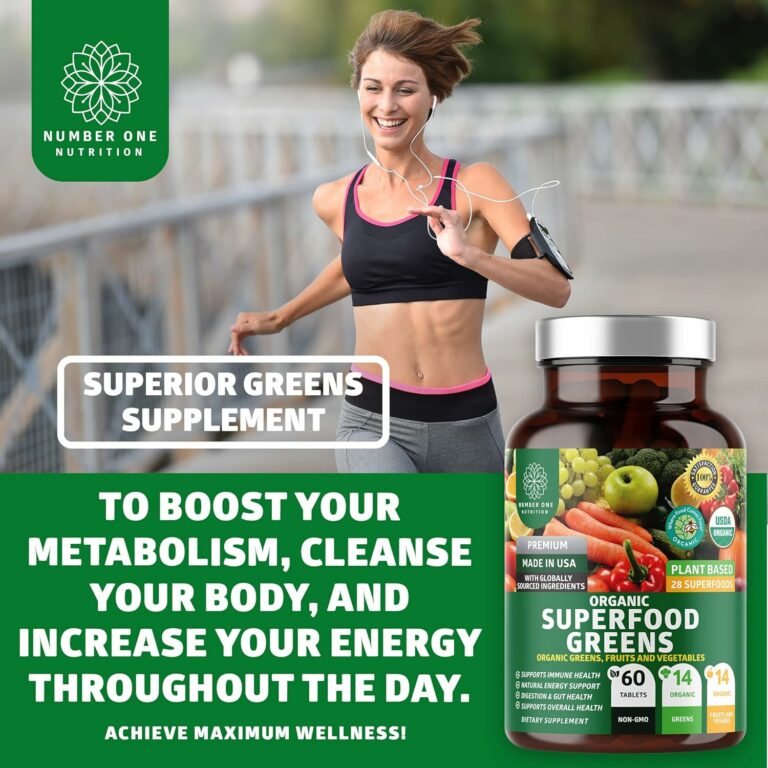Natural Ways to Boost Collagen Production
Have you ever looked in the mirror and seen fine lines? You might wish for a magic potion to make them disappear. While we can’t find the fountain of youth, collagen is real and powerful. It keeps our skin young, bones strong, and joints healthy.
But, our bodies make less collagen as we get older. We lose about 1-2% each year after we turn 30.
Don’t worry! Nature gives us many ways to boost collagen naturally. What we eat and how we live can help our bodies make more collagen. In this article, we’ll look at these natural ways to improve skin and health. We’ll see that the best ways to fight aging are often simple and easy to do.
Key Takeaways
- Collagen production naturally decreases by 1-2% annually after age 30
- A balanced diet rich in vitamin C and antioxidants supports collagen synthesis
- Lifestyle factors like sun protection and stress management play critical roles
- Regular exercise, specially resistance training, can boost collagen levels
- Proper hydration and quality sleep are essential for maintaining collagen
- Natural supplements and targeted skincare can enhance collagen production
Understanding Collagen and Its Role in the Body
Collagen is a key protein in our bodies. It’s found in our skin, bones, and muscles. It helps keep us healthy and looking good.
As we get older, our bodies make less collagen. This can cause our skin to lose firmness and elasticity.
What is Collagen?
Collagen is a protein that supports our tissues. It’s in our skin, bones, and muscles. There are 28 types of collagen, but three are the most important.
- Type I: Supports skin elasticity, hydration, and bone density
- Type II: Cushions joints and improves flexibility
- Type III: Enhances skin suppleness and vascular health
Benefits of Collagen for Skin and Joints
Collagen is good for our skin and joints. It can make our skin look younger and our joints more flexible. This can help with joint pain.
“Collagen is like the fountain of youth for our bodies. It’s the key to maintaining skin firmness, joint flexibility, and overall structural integrity as we age,” says Dr. Jane Smith, a leading dermatologist.
Collagen does more than just help our skin and joints. It can also make our bones stronger and help wounds heal faster. Some studies show that collagen supplements can help build muscle, but we need more research.
| Age | Collagen Status |
|---|---|
| 35 | Collagen production begins to slow |
| 40 | Collagen depletes faster than body can reproduce |
| 60 | Over half of body’s collagen is depleted |
Knowing how collagen works in our bodies is important. It helps us find ways to keep it healthy and support our overall well-being.
Factors that Affect Collagen Production
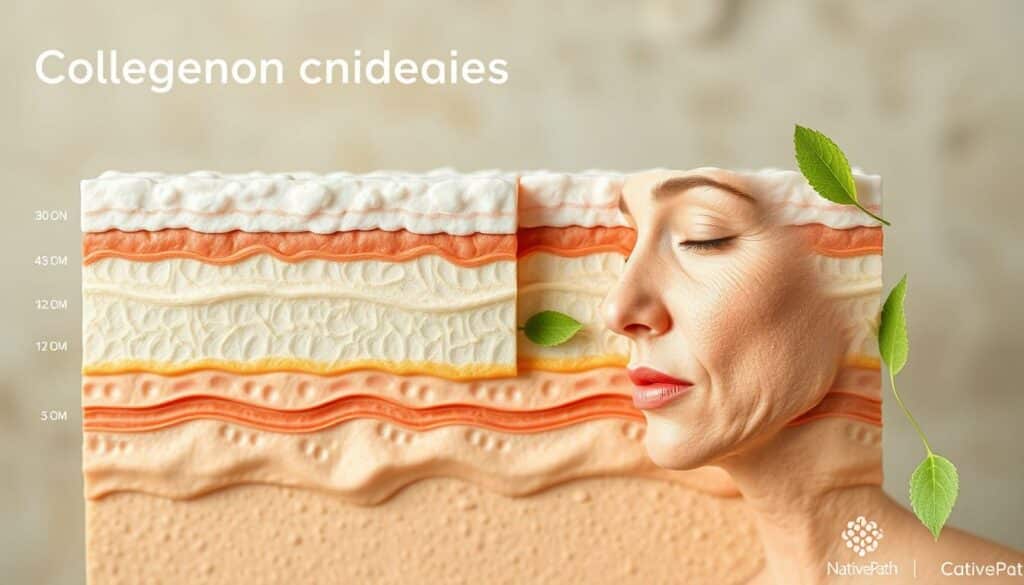
Collagen is like your skin’s youth. It starts to go down in your mid-20s. This, along with other things, makes your skin look older.
Age and Collagen Depletion
With more birthdays, your body makes less collagen. By age 20, it starts to go down by 1% each year. This makes wrinkles and dry skin.
Lifestyle Choices Impacting Collagen Levels
Your daily choices affect your collagen. Sun damage speeds up collagen loss, making you look older sooner. Smoking hurts collagen and elastin, making your skin less elastic. Eating too much sugar makes collagen stiff.
Bad air and pollution harm collagen. Stress raises cortisol, which stops collagen production. Not sleeping well hurts your skin’s repair.
“Understanding these factors is key to maintaining youthful skin. By making informed choices, you can support your body’s collagen production and preserve your skin’s health.”
| Factor | Impact on Collagen |
|---|---|
| UV Exposure | Accelerates collagen breakdown |
| Smoking | Degrades collagen and elastin |
| High Sugar Diet | Stiffens collagen fibers |
| Pollution | Generates damaging free radicals |
| Chronic Stress | Inhibits collagen production |
Knowing these factors helps you keep your collagen up. This lets you choose better for your skin’s health and look younger.
Dietary Sources to Enhance Collagen Production
The fountain of youth might be a myth, but collagen is real. As we age, our bodies make less of this important protein. The good news? We can make more collagen by eating the right foods.
Foods Rich in Collagen
Collagen-rich foods help keep our skin young and our joints healthy. Bone broth is at the top, full of amino acids that help make collagen. Oily fish like salmon and mackerel give us collagen and omega-3s. Chicken and egg whites are great sources too.
Vitamins and Nutrients That Support Collagen
Vitamin C is key for making collagen. Citrus fruits, berries, and leafy greens are full of it. Zinc and copper in nuts and seeds help keep collagen strong. Garlic, with its sulfur, helps fix damaged collagen.
| Food | Collagen-Boosting Nutrient | Benefit |
|---|---|---|
| Bone Broth | Amino Acids | Direct collagen source |
| Salmon | Omega-3, Protein | Supports collagen structure |
| Oranges | Vitamin C | Essential for collagen synthesis |
| Almonds | Zinc, Copper | Aids collagen maintenance |
| Garlic | Sulfur | Helps repair damaged collagen |
Eating collagen-rich foods and nutrients is like investing in your skin. It’s the biggest organ in your body. Start now, and your future self will be grateful.
Hydration and Collagen Synthesis
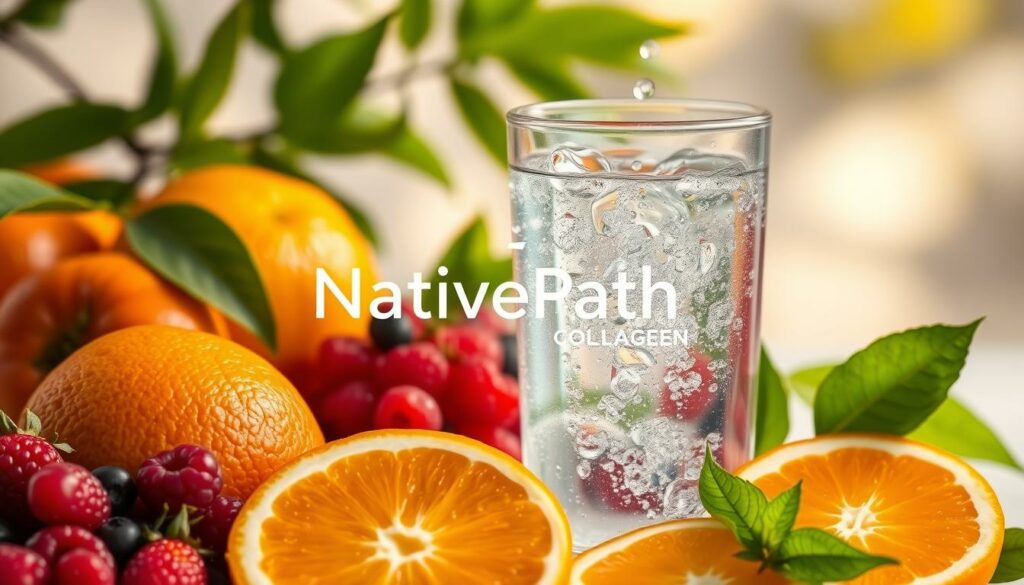
Water is key for healthy skin. It helps make collagen, which keeps our skin young and firm. As we get older, our skin makes less collagen. This leads to wrinkles and sagging skin.
Importance of Water for Skin Health
Drinking enough water is important for skin health. It helps our skin stay elastic and makes more collagen. Our bodies make less collagen as we get older, by about 1% each year.
Drinking water helps move nutrients to our skin. This is important for making collagen and keeping our skin healthy.
Hydrating Foods to Consider
Eating hydrating foods is also good for our skin. Foods like cucumbers, watermelons, and tomatoes are great. They give us water and important vitamins and minerals.
| Hydrating Food | Water Content | Benefits for Skin |
|---|---|---|
| Cucumber | 96% | Rich in antioxidants, promotes collagen synthesis |
| Watermelon | 92% | Contains lycopene, protects against UV damage |
| Tomatoes | 94% | High in Vitamin C, essential for collagen production |
Eating these foods and drinking enough water can help your skin. It takes about 4-8 weeks to see the difference. Remember, being consistent is important.
Natural Supplements for Collagen Production
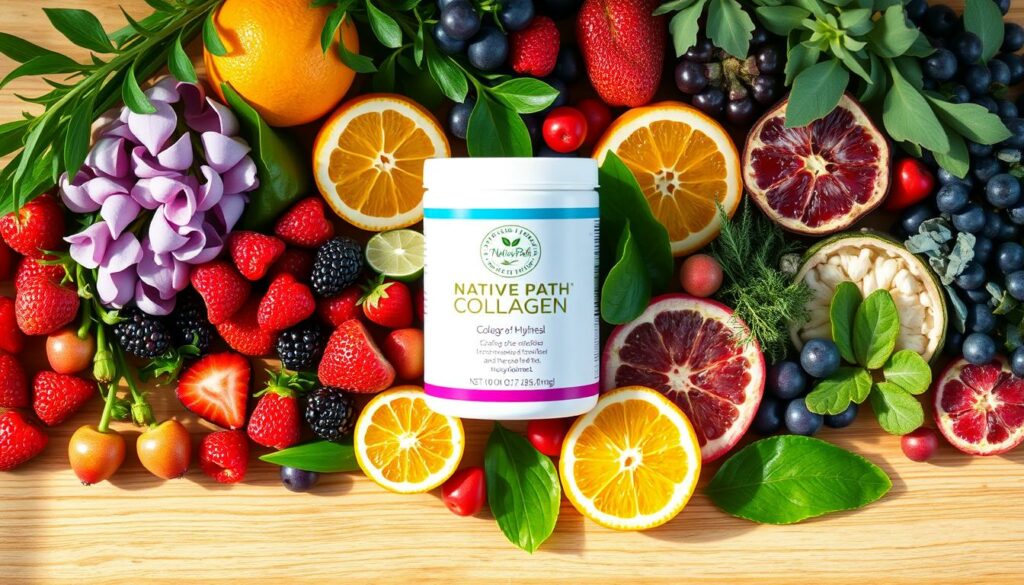
Collagen supplements are popular for boosting collagen naturally. They help support your body’s collagen as we age. Our natural collagen levels go down over time.
Collagen Peptides: What You Need to Know
Collagen peptides are easy for our bodies to absorb. They come in powders, capsules, and creamers. Here are some top picks:
- Bubs Naturals Collagen Peptides: 18g protein per serving
- Vital Proteins Collagen Peptides: 18g protein per serving
- NOW Multi Collagen Protein: 10g protein per serving
When picking a collagen supplement, look at protein, collagen types, and dietary needs. Some, like Alaya Naturals’ Multi Collagen, mix types I, II, III, V, and X from different animals.
Benefits of Vitamin C
Vitamin C is key for making collagen. It’s an antioxidant that helps make collagen and protects our skin. Some benefits include:
- Helping make more collagen
- Protecting skin from UV damage
- Improving skin texture and look
Many collagen supplements have vitamin C to make them work better. For example, Thorne Collagen Plus is made for skin health. It has vitamin C.
Remember, collagen supplements are best with a healthy diet and lifestyle. Always talk to a doctor before starting new supplements.
Skin Care Products That Promote Collagen
Your skin care routine is key to keeping your skin young. Topical collagen boosters are popular for boosting collagen. Let’s look at good treatments and why sunscreen is important.
Topical Treatments for Boosting Collagen
The “2X Collagen Booster” is a great product, priced at $28.00. It has over 80% Hydrolyzed Collagen extract. It helps with loss of elasticity, dullness, and dehydration.
It also has Niacinamide to improve skin barrier and reduce redness. Hyaluronic Acid adds deep hydration.
The booster’s MP-7™ has amazing results:
- Increases total collagen by 6.8% in 11 days
- Boosts collagen I and III synthesis by 179% and 194% respectively
- Reduces wrinkle depth by 15% in 15 days
- Increases skin firmness 13 times in just 15 days
Importance of Sunscreen
Sunscreen is essential for keeping collagen. UV rays damage collagen, speeding up aging. Use a broad-spectrum sunscreen in your routine to prevent damage.
For best results, use sunscreen with topical collagen boosters. This keeps your skin’s collagen levels up. A good skin care routine with these items helps keep your skin young and healthy. Always test new products and talk to a dermatologist for advice.
Lifestyle Habits to Enhance Collagen Production
Boosting collagen isn’t just about what you eat or apply to your skin. Your daily habits are key to keeping collagen healthy. Let’s look at how sleep and managing stress affect your skin and collagen.
The Role of Sleep in Skin Health
Good sleep is essential for skin repair and making collagen. Deep sleep boosts growth hormone, helping with collagen. Try to sleep 7-9 hours each night to help your skin renew itself.
Poor sleep quality can raise cortisol, breaking down collagen. To sleep better:
- Stick to a consistent sleep schedule
- Create a relaxing bedtime routine
- Keep your bedroom cool and dark
- Avoid screens before bed
Stress Management Techniques
Stress can harm your skin and collagen. High stress means more cortisol, breaking down collagen. Adding stress-reducing habits to your life can help keep collagen:
| Technique | Benefits |
|---|---|
| Meditation | Lowers cortisol, improves sleep |
| Yoga | Reduces stress, promotes relaxation |
| Deep breathing | Calms nervous system, decreases tension |
| Regular exercise | Boosts mood, reduces stress hormones |
By focusing on sleep and stress reduction, you’re not just getting healthier. You’re also helping your body make more collagen. These changes can make your skin look better from the inside out.
Exercise and Its Impact on Collagen Levels
Physical activity is very important for our health. It helps make more collagen and keeps our skin healthy.
Types of Exercise Beneficial for Collagen
Not all exercises help collagen the same way. Resistance training and HIIT are best for making more collagen. These workouts help keep our muscles strong, which is good for collagen.
- Resistance training: Weight lifting, bodyweight exercises
- HIIT: Sprints, burpees, jump squats
- Low-impact activities: Swimming, cycling, yoga
How to Incorporate Exercise Effectively
To get the most from exercise, mix cardio and strength training. The CDC says only 23 percent of men exercise enough. Here’s a simple plan to start:
| Day | Activity | Duration |
|---|---|---|
| Monday | Resistance training | 45 minutes |
| Wednesday | HIIT workout | 30 minutes |
| Friday | Low-impact cardio | 60 minutes |
| Saturday | Yoga or stretching | 30 minutes |
Being consistent is important. Regular exercise boosts collagen and keeps your skin looking good. Start slow and get better over time to avoid injuries.
Avoiding Collagen-Damaging Factors
Collagen is like a magic potion for our skin. But, it faces many dangers every day. Knowing these threats helps us keep our skin looking young and healthy. Let’s look at two big enemies of collagen: smoking and too much sugar.
Smoking and Its Effects on Skin Youthfulness
Smoking is very bad for our skin’s collagen. The harmful chemicals in cigarettes damage collagen, causing wrinkles and aging too soon. Dr. Janet J Wong says smokers often look older than they really are because of this damage.
- Reduced blood flow to the skin
- Decreased oxygen supply to skin cells
- Increased free radical damage
- Accelerated breakdown of existing collagen
The Impact of Excess Sugar on Collagen
Too much sugar is also bad for our skin’s collagen. Dr. Kathryn Schwarzenberger says that too much sugar makes collagen fibers stiff and brittle. This makes our skin saggy and less elastic.
To fight sugar’s effects on collagen:
- Limit foods with added sugars
- Choose complex carbs over simple sugars
- Drink lots of water to flush out sugar
| Factor | Impact on Collagen | Prevention Tips |
|---|---|---|
| Smoking | Breaks down collagen fibers | Quit smoking, use nicotine replacement therapy |
| Excess Sugar | Causes glycation, stiffens collagen | Reduce sugar intake, choose whole foods |
By staying away from these collagen enemies, we can keep our skin looking young. Small changes in our daily life can make a big difference in our skin’s health.
Conclusion: Embracing a Collagen-Boosting Lifestyle
Using a natural way to boost collagen is important for young, healthy skin. Eating foods rich in collagen, taking supplements, and taking care of our skin helps. This not only makes our skin look good but also strengthens our bones and joints.
Studies show that collagen supplements can really help. For example, marine or bovine collagen can make our skin more elastic. Eating dark chocolate and tomatoes also helps protect our skin from the sun and keeps it moist.
To keep our collagen levels up, we should avoid too much sun, stop smoking, and manage stress. Regular exercise, drinking plenty of water, and sleeping well are also important. By doing these things, we help our body make more collagen. This makes our skin and body stronger and healthier.

